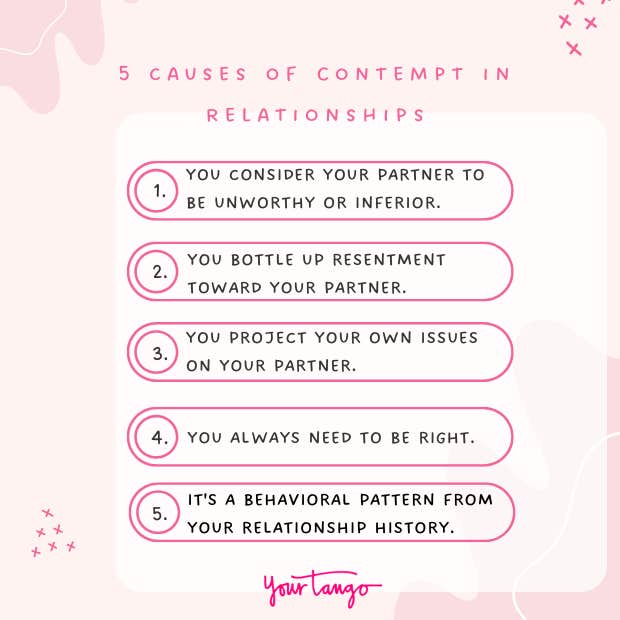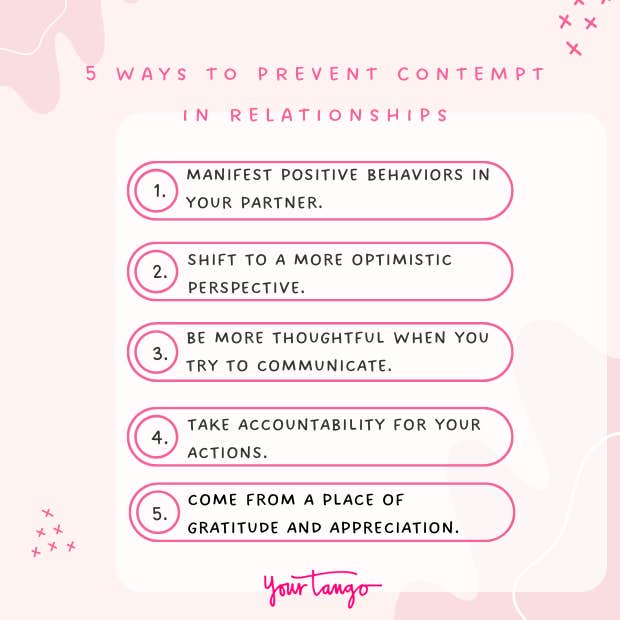Why Contempt Is So Damaging In Relationships (And How To Prevent It In The First Place)
It's exactly like watching a horrible car wreck, except you can prevent it from happening.
 Manu Reyes / Shutterstock
Manu Reyes / Shutterstock There's a dark side of marriage that is unequivocally dangerous to the health of relationships and the individuals in them.
If you find yourself feeling contempt toward your spouse, the time to shed some light into the darkness is now — before you see signs your marriage is over.
If you're in an unhappy marriage, then you need to turn things around before it's too late and your connection, love, and intimacy with your spouse are permanently affected.
Logic and wedding day bliss would tell you that feeling contempt toward your spouse isn’t natural. Surely you would have scoffed at the mere idea of it back when you were happily planning your future together.
What is contempt?
Contempt rears its ugly head from a cauldron of long-simmering negative thoughts.
It doesn’t attack the habits or misdeeds of its target. It goes straight for the heart, ripping at the person’s sense of self with weapons like sarcasm, mocking, and hostile humor.
John Gottman’s "Four Horsemen of the Apocalypse" are frequently referenced for its ability to predict the demise (or potential redemption) of a marriage. These include criticism, contempt, defensiveness, and stonewalling.
Contempt and criticism in marriage relationships are the two "offending" behaviors and stonewalling and defensiveness are countering "protective" behaviors.
By the time you get to the point of feeling contempt for your spouse, your marriage has already taken a turn for the worse.
This disposition, which is a combination of disrespect and disgust, is the greatest predictor of divorce.
Imagine looking at the person you married and feeling such disdain that you want nothing to do with them. Imagine seeing this person as so far beneath you that they are inferior, unworthy, and a trigger for your disgust.
That is how dangerous contempt is. Its very nature of moral superiority shreds the intimacy in a marriage and the equality on which it depends.
5 Causes of contempt in relationships
1. You consider your partner to be unworthy or inferior.
Contempt may be triggered by behavior or a series of behaviors. But the emotion targets the person — not the behaviors by themselves — and creates a no-win situation.
The proverbial saying “familiarity breeds contempt” adds a bit of eloquence to the harshness of feeling contempt toward your spouse. But the meaning is the same.
The longer and more intimately you know someone, the more intimately you know that person’s flaws and habits. And the easier it becomes to be intolerant of what you don’t like.
Contempt, though, isn’t just about differences in style and preference. It’s about a belief that another person has a moral or character flaw that makes that person unworthy and inferior to you.
In this regard, contempt reeks of judgment and self-assigned moral superiority.
2. You bottle up resentment toward your partner.
It’s tragic, really, that contempt ever has the opportunity to grow in a marriage. After all, it’s not a spontaneous reaction to an uncomfortable conversation or situation.
It arises, instead, from a stewing, smoldering accumulation of resentments over time. Too many disappointments. Too much neglect. Too many broken promises.
They all start to fume under the surface, like magma churning in a volcano, ready to pour over everything in its path when the volcano explodes.

3. You project your own issues on your partner.
If you are the contemptuous person in your marriage, your hostility is outwardly directed toward your spouse. But your projection is, at least in part, actually masking what you despise in yourself.
You're not throwing darts at specific behaviors or failings, but at scathing character judgments you've made like, “You’re lazy/weak/crazy/stupid/irresponsible!”
Instead of focusing on how to communicate with your spouse better, especially when you’re angry, you go for character assassination.
You become a psychiatrist — miraculously without the qualifications — able and quick to diagnose your spouse’s mental ineptitude. “He’s a narcissist!” “She’s neurotic/bipolar/psychotic!”
You may even take to the internet to do an investigation and to justify your diagnosis.
4. You always need to be right — no matter how wrong you (and your behavior) are.
Contempt does not inspire change — in either party.
But, like a karmic boomerang, it tends to serve as a petri dish for more of the same.
Through "projective identification," people almost instinctively live up (or down) to how they're perceived. Tell a teenager enough times that he's lazy and stupid, and you’re likely to create a self-fulfilling prophecy.
Accuse your spouse of having ulterior motives around every one of the opposite sex, and you may one day have the opportunity to say, “I told you so.”
If you keep telling your partner they're wrong, correcting their speech in an inappropriate way or setting, speak in a way that is disrespectful and only serves to close lines of communication, you'll get exactly what you asked for, regardless of your desires — let alone your partner's.
5. It's become a pattern of behavior for you because of your relationship history.
The tragedy of feeling contempt toward your spouse is that it's so unnecessary and preventable.
Some people have contemptuous personalities and are inclined to project their self-proclaimed superiority onto everyone in their lives.
But when your love turns to contempt, chances are you have cumulatively sequestered your negative thoughts.
Instead of communicating your feelings and needs in an open, responsible way, you “stuff the sting” of your emotional blows.
Perhaps you have tried to communicate in the past but have been greeted with indifference, lack of compassion, or lack of change. And the repetitive defeat just wasn’t worth the effort anymore.
Your contemptuous retaliation may appear to give you recourse. But you are actually destroying your own health and happiness as much as you are that of your spouse and marriage.
5 Ways to prevent contempt in relationships
1. Manifest positive behaviors in your partner.
Remember that “projective identification?”
It works in positive ways, too!
You have the choice to help manifest the behaviors and attributes you seek by changing how you see them.
If you're seeking to destroy your marriage, then feeling contempt toward your spouse will guarantee your success.
But if you can imagine the life you want to have with your partner, the successes and achievements you wish for your partner because you know how hard they've been working toward them and how much it would mean to them, and how beautiful your future will be together, you can manifest these hopes and dreams for your future together.
Plus, trying to bring out the best in your partner makes them want to do the same in return, and you will only grow closer and happier together.
2. Shift to a more optimistic perspective.
If you want the happiness you once knew but just feel so hurt that you don’t know how to get there, shift your perspective. Your thoughts — both positive and negative — are the seeds of your destiny.
Marriage, like the people who comprise it, tends to live up to the qualities and merits assigned to it. How you choose to see changes what you see.
Why not give your spouse — and ultimately yourself and your marriage — the benefit of the doubt?

3. Be more thoughtful when communicating with your partner.
Try to use more direct communication, especially if something is bothering you. Of course, do your best to use care and tact when discussing your thoughts. "I feel" statements are much better received than sweeping generalities and nit-picky complaints.
Even though it may seem difficult to find a way to communicate more directly with your partner, to keep from bottling things up and opening up an environment of resentment between the two of you, try your best.
Listen to your partner if they feel hurt by something you said without interrupting them or diminishing their emotions. This is as difficult for you as it is for your partner, so remember that you're doing this together.
4. Take accountability for your actions and the hurt you've caused your partner.
Trying to heal a relationship means cleaning out and taking care of the wound at the core of the issue.
It's never easy to accept responsibility for something that causes another so much pain, but it's the only way to show your partner that you acknowledge them and you truly do appreciate who they are and the value they bring to your relationship.
In situations such as these, no one is innocent, and you really need to own up to this.
Whatever superiority you felt, or whatever plane of being judgmental you were on, you must let go of completely.
Have you been right about everything?
Also, how much did it matter in the end?
5. Come from a place of gratitude and appreciation.
You can create a fresh new start for your relationship by building upon your foundation with renewed love, gratitude, and appreciation for each other.
Forget about the little things that might have annoyed or agitated you. Remember who you fell in love with and why. What about your partner, as an individual, makes them special to you? Remember all those little things that made you smile or gave you butterflies.
No matter how long ago that was, you can still take each day, step by step, to focus your attention on what your partner did that day that made you grateful. Write down something you appreciate about your partner, like that adorable, sleepy smile they get when they first come down the stairs in the morning and they feel the warmth of the coffee mug when you offer it to them.
Maybe it's worth going through some old photos, just to see where you were a year, five years, or 20 years ago, and how far you've come since then.
If you can appreciate the journey, even by staying present in the moment, one day at a time, you'll have so much to look forward to in your future ahead.
Dr. Jerry Duberstein, PhD, and his partner Mary Ellen Goggin, JD, are the co-authors of the book, Relationship Transformation: Have Your Cake and Eat It Too, practice as couples and marriage counselors, and lead private intensive couples retreats.

